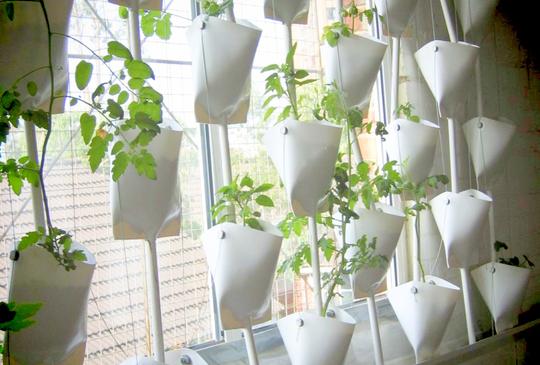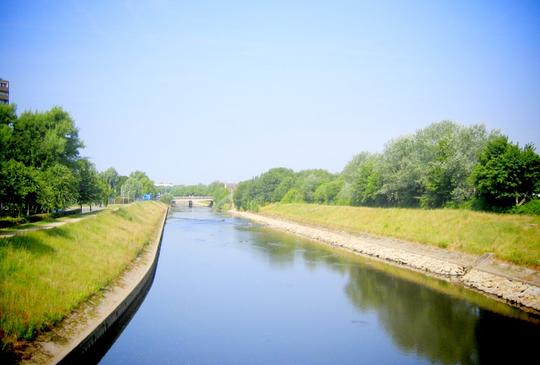
It’s all about food
Vincent gave me an hour and a half of his time to talk about this complex and exciting project. Everything begins with and is connected to worms. The production of worms is called Vermiculture and encapsulates what Vincent and his team are doing beside the River Irwell in Salford.
The worms eat all the green and brown waste produced by the project. From that they produce worm casts, which are black gold to anyone wanting to grow food (or anything). The Worms also provide worm tea, which is also collected and in dilution sprayed on the plants and trees in the Forest Garden (more on that later). The worms reproduce without much intervention and will be used as a feed source for the fish which are part of one of the growing systems in the building.
The fish, sustained by the worms then excrete their own waste which is mixed with ever circulating water and producing the crucial nutrient mix for the leafy green crops which are growing in the building and on the roof in a large polytunnel. These crops are being grown using aquaponics, and hydroponics. All of this in a continuous cycle which might sound very scientific, but it is all about food!

The other experimental system being tested is mushroom growing. Once the festival ends the first floor of the building will become the mushroom cultivation area. The team have been testing various types of growing media ahead of establishing the first floor for production. The plan is to produce Oyster, and Shitake mushrooms and sell these to generate income for the project. Restaurateurs who have sampled the Salford grown fungi said that they were the best they had ever tasted. That isn’t a surprise to me, if a mushroom is flown in from China it is not likely to taste as good as one picked and cooked within minutes. But the income generating potential of these fungi is significant. Vincent estimates that post-MIF, once production is established, they can generate £165,000 from the sale of mushrooms.
Outside, across the road from the building is a Forest Garden. Newly planted it doesn’t look much, but as it matures the ambition is for it to be the densest urban agro forestry system in Europe. A forest garden is a designed system based on trees, shrubs and perennial plants that provide edible crops. These are mixed to mimic the structure of a natural forest – the most stable and sustainable type of ecosystem in this climate. When established, forest gardens have ‘layers’ of growing, providing maximum use of space by growing plants in layers (also called stacking).
Vincent talked about how much he had learned about forest gardens when he spent time with communities who cultivate all their plant-based food using this means of production in Ethiopia and Nigeria. I don’t know very much about Forest Gardens, but was intrigued by the idea that a garden in Ethiopia could have 18 layers. I’ve visited Ethiopia and Eritrea and know how verdant those countries are when not in drought conditions, but the picture that 18 layers of cultivation conjures is mind boggling. We have clearly got much to learn from them, and Vincent is sharing his learning in Salford.
Another aspect of the project is a shop, called 78 Steps because it is 78 Steps from the entrance to the building that houses the growing systems being tested by Vincent and his team. The shop grew out of another social enterprise, Whole Box; a Veg Box scheme that was launched 18 months ago to provide East Salford an area with limited access to fruit and vegetables an opportunity to support a local business and get their food locally at the same time. As the number of customers grew from 3 to 50 to 80 so did their requests for additional products, and different delivery dates. The natural progression was to open a wholefood shop. The shop, the first of its kind in Salford, provides training and employment for residents interested in learning about setting up and managing a food business. As shops go, I also though it looked beautiful – go see for yourself.
What interests me most about this innovative project is the bringing together of research, cutting edge technology, community involvement and a strong commitment from the researchers to invest time working with the community and responding to feedback from the community. The development of the wholefood shop is a good example of this.
To illustrate my point about time investment, Vincent is studying for a PhD, which he aims to finish in October. He spent a long time searching for a building, and recounted the need for three things to come together: the right sort of building, some land and a community. He was particularly struck by the location of the mill within the Blackfriars estate sitting as it does in a post industrial landscape beside the Irwell River. He has committed to spending ten years working on this, the sort of time frame needed and one which is not generally available through grant funding. The way forward here is to work with other Universities, having other researchers attached to the Biospheric Foundation and also to take on commercial pieces of work testing different ways of growing to see what works, what is the payback time for investment, what its impact is etc. This is why the research input is so important, if a new idea doesn’t work that isn’t a failure, its part of building up a knowledge base that can be shared. One example of this is a ‘biological and technical façade’ which will become one of the external walls of the mill. Another is testing the sorts of crops that are best suited to the particular climate of the polytunnel on the roof. Spindly plants or plants that have gone to seed represents lessons learnt.
Looking out across the river there is more open space that could be used for outdoor growing and the contrast in the view along the river into Salford contrasts with the view along the river towards Manchester, with its high rise office blocks.

There is so much more to tell about this project: chickens and bees on the roof, income-generating crops such as micro salads for restaurants as well as food grown for the wholefood shop, job opportunities for local people. Further into the future solar arrays to produce power, rainwater collection, solar water heating, a micro brewery with spent barley used to feed the fish and spent corn to be used in mushroom production.
With weather patterns as they have been in the UK, the more that we can learn about growing food in different ways to feed people in cities, using the earth’s resources as efficiently and as lightly as possible, the better.
The Biospheric Project is at Irwell House, East Phillips Street, M3 7LE and you can find out more at their website, on Facebook or follow their progress on Twitter: @BF_UK_CIC
Contributor Profile
Dr. Debbie Ellen is a researcher with an interest in sustainable food production and consumption. She has researched New Smithfield Wholesale Market in East Manchester and its contribution to Manchester's Food Supply (2009) and authored a report on Farmers Markets in Greater Manchester (2009). In 2010, Debbie scoped the baseline for Sustainable Food Production and Consumption for Manchester: A Certain Future (Manchester's Climate Change Action Plan).

